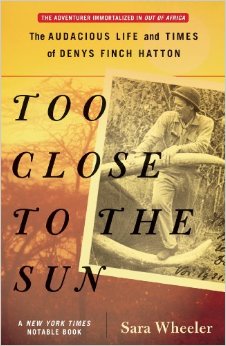'Too Close to the Sun: The Audacious Life and Times of Denys Finch Hatton'
by Sara Wheeler
Random House, 292 pp., $27.95
Denys Finch Hatton lived life on his own terms. Tall and handsome, with a devilishly crooked smile, he was famously irresistible to women and equally unable to commit to any of them. Born into money and the English aristocracy, he refused to conform and instead fled England for the then-largely untracked British East Africa (now Kenya).
His exploits in the African bush would likely have long ago faded into obscurity but for his good fortune to have had affairs with two much more interesting women who, as it turns out, were great writers and chose to immortalize him in "Out of Africa" (Karen Blixen, under the pen name Isak Dinesen) and "West with the Night" (Beryl Markham).
In "Too Close to the Sun," British author Sara Wheeler laboriously details Finch Hatton's life and times. He attended Eaton and Oxford, but without enthusiasm (except for golf) and left behind a decidedly mediocre academic record. Rather than conform to the demands of his position or the expectations of British society, he fled instead to British East Africa. He invested in various farming enterprises and devoted most of his time to exploring the Kenyan jungle, ultimately serving as a jungle guide for a variety of wealthy clients.
Finch Hatton secured his place in history through his relationships with Blixen and Markham. Blixen, divorced from an unfaithful spouse, struggled to establish a coffee plantation in the Kenyan bush, "at the foot of the Ngong Hills" as she famously described it in "Out of Africa." Although Finch Hatton lived with her, he simultaneously had a romantic relationship with Markham, a much younger woman who had been raised on the African plains by her father. Curiously, both women produced critically acclaimed autobiographies featuring, in part, their liaisons with Finch Hatton.
Blixen's coffee plantation finally failed in 1931, forcing her to leave her cherished Africa. Shortly before Blixen's tormented departure, Finch Hatton died in a fiery small plane crash in the African bush. Blixen returned to her native Denmark brokenhearted and poured her heart into her writing, producing not only "Out of Africa" but a variety of short stories, including "Babette's Feast." She was twice nominated for the Pulitzer Prize.
It is difficult to imagine anyone working up the enthusiasm to devote a full-length biography to Finch Hatton had he not already been featured in two outstanding autobiographies, not to mention a Hollywood movie. But, of course, writing a biography with that sort of competition would be difficult for even the best of writers.
Wheeler's writing, unfortunately, has all the romance, thrill and excitement of a high-school chemistry textbook. Worse, the book is littered with elliptical historical references, long chapters on Finch Hatton's genealogy, and random footnotes to insignificant historical controversies over events in his life.
This nearly impenetrable thicket of prose might be worth it if either the subject was worth the effort or the writing even remotely approached the lyricism of either of Finch Hatton's lovers' autobiographies. The book, unfortunately, fails on both accounts.
